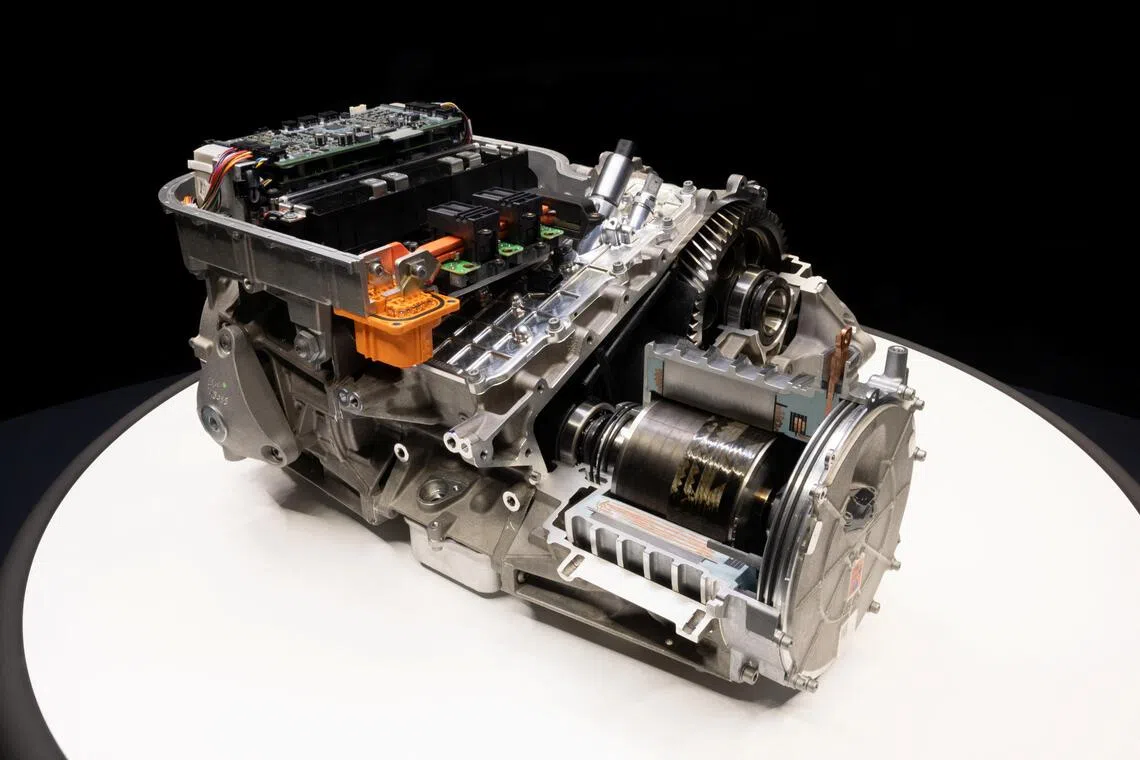Ferrari lifts hood on EV tech in first electric car Elettrica with top speed of 310kmh
Sign up now: Get ST's newsletters delivered to your inbox

The EV powertrain system seen as the new electric technology developed for Ferrari’s first electric car is being unveiled at the company in Italy on Oct 8.
PHOTO: REUTERS
MARANELLO, Italy – Ferrari has unveiled the technology which will power its hotly anticipated first electric car, the Elettrica, as the 78-year-old luxury Italian sportscar maker looks to add battery power to its hybrid and petrol-engine models.
In a closely guarded event at its Maranello headquarters, a Ferrari-red cover was pulled back on a stage to reveal the Elettrica’s production-ready chassis: a car base, with battery pack and electric motor, though with no wheels or outer shell.
The completed car, which Ferrari is expected to present in 2026 at a global premiere, will have a top speed of 310kmh – slightly slower than most of its engined models and a range of at least 530km.
The four-door, four-plus seat car will have a specially designed sound system to amplify actual vibrations from its powertrain to create a distinctly electric Ferrari sound, rather than just faking engine noise.
The unveiling of the inner workings of Ferrari’s maiden electric car marks a milestone for the auto industry that is grappling more widely with a shift from the internal combustion engine to the electric battery.
“Today... is an historic day for us. We all have goosebumps,” said chief executive officer Benedetto Vigna, who said the electric car would complement, not replace, the company’s existing models. “The EV (electric vehicle) is an addition, not a transition.”
Ferrari needs an EV for next generation of rich kids
Like other high-performance brands, Ferrari has been cautious about electrification.
Reuters reported in June that Ferrari had delayed a second EV model until 2028 because of a lack of demand. Rival Lamborghini, part of Volkswagen, has delayed its first EV until 2029, saying the market is not ready.
Luxury automaker Porsche forged ahead with EVs, but has been caught between a crowded Chinese market and Western buyers who still want Porsche’s loud combustion engines. Delays to its EV roll-out have hit parent Volkswagen.
Ferrari is aiming to have 20 per cent of its model line-up fully-electric by 2030, its long-term business plan unveiled on Oct 9 shows. That is below the 40 per cent target it set for 2030 in its business plan three years ago.
Ferrari is under less pressure than mainstream automakers to go electric ahead of a 2035 European Union ban on new fossil-fuel car sales, as it can sell combustion-engine models running on higher-cost synthetic e-fuels its customers can afford.
But wealthy younger buyers are keen to go electric.
“If you think about the next generation of kids, to remain relevant, maybe Ferrari needs an electric line-up that represents the pinnacle of its type,” former Aston Martin chief executive officer Andy Palmer told Reuters.
Ferrari needs ‘an EV that is more than an EV’
The Ferrari Elettrica, expected to cost at least €500,000 (S$750,000), Reuters reported in 2024, comes almost two decades after the first hybrid technology appeared in its Formula One cars in 2009. Ferrari began selling hybrid models in 2019.
The Elettrica’s chassis and body will be made from 75 per cent recycled aluminium and the battery is fully integrated into the floor to help lower its centre of gravity, which will help with performance and speed. It will have a fast-charging battery.
Industry experts said the challenge for brands like Ferrari was how to create something more than just a high-spec version of a premium EV, which already has instant acceleration.
The upcoming Tesla Roadster, for example, is advertised with a top speed of more than 402kmh.
Ferrari’s cars, which start with a price tag of more than €200,000, need to offer more.
“If Ferrari is going to be successful, it has to bring to the market an EV that is more than an EV,” Mr Palmer said. “(It) is not offering you acceleration, it’s not offering you top speeds because you can buy that in a €30,000 BYD.”
Mr Phil Dunne, a managing director at consultancy Grant Thornton Stax, said demand was yet to catch up, but Ferrari’s strength would be offering its large base of wealthy consumers the same experience and feeling its combustion-engine models do today.
“If their customers want to be environmentally friendly today, they can have a Tesla, they can have some other EV,” Mr Dunne said. “Teslas can give you an amazing feeling of power, but it doesn’t feel anything like a Ferrari.” REUTERS


